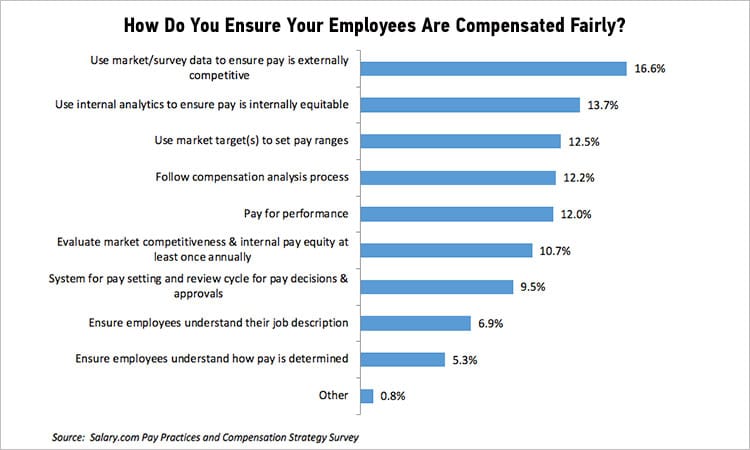Why Is External & Internal Equity in Compensation So Important?
Written by Connor Harrison
May 15, 2019

Prioritizing fair pay and closing the gender pay gap are two of the biggest initiatives in compensation today. Implementing processes to sustain fair pay throughout the employee’s journey from hiring to promotion is crucial for your organization.
What is External and Internal Pay Equity?
External equity and internal equity make up the two halves of fair pay. Both are key toward attracting and retaining top talent, but they require substantially different approaches to manage.
External equity
Salary competitiveness versus the market. It is impossible to ensure fair pay without using industry and regionally-specific market data to establish appropriate salary ranges for each position.
Internal equity
Equal pay for equal work within the organization. When organizations leverage market data to establish pay ranges, they incorporate that data into their overall salary structure. Jobs of comparable value are assigned to the same grade range, and the range of pay is the same for those jobs, which promotes equity. This assures that employees within an organization are paid fairly versus each other.
How Companies Are Addressing External and Internal Pay Equity
The specific tactics that your organization should use to address pay fairness varies widely depending on business goals. However, according to our Pay Practices and Compensation Strategy survey, there are three approaches successful organizations consistently use to ensure pay fairness:
- Leverage market data to establish externally competitive pay ranges.
- Use analytics to ensure pay is internally equitable.
- Build a culture of pay transparency to foster a positive perception of compensation decisions in the organization.

External Equity in Compensation System – Leveraging Market Data
By using HR-reported market data, your organization can ensure it is keeping up with a rapidly moving job market, and never falling short of fair pay for any of its positions. Nearly 17% of organizations in our survey use market data to ensure pay is competitive. Additionally, 12.5% use market data to help establish pay ranges for positions within the company’s overall salary structure.
Unlike HR-reported data, consumer-reported should never be relied on for external pay points. The correlation between accurate market data and fair pay is not coincidence. According to our survey, 23% of companies that agree or strongly agree that their employees are paid fairly used market data.
Internal Equity in Compensation System – Leveraging Analytics
With external competitiveness in mind, you should analyze outlying jobs and employees in your organization’s salary structures to see if you are maintaining internal pay equity. To this end, 13.7% of organizations use survey data and internal analytics to ensure pay is equitable, and an additional 12.2% follow a formal compensation analysis process.
Furthermore, we suggest HR professionals self-audit and review these decisions frequently to keep up with a fast-moving market and changing conditions within their organizations. Our survey shows that 10.7% of organizations review external data and internal equity at least once a year. Plus, an additional 9.5% have a system in place for reviewing pay decisions and approvals.
Employee Perception of Internal Equity and External Equity Is Critical
Organizations armed with accurate market data and an internally-equitable salary structure have the blueprint for fair pay. However, your organization must also be proactive about communicating with employees.
The mere perception of unfair pay is enough to sink an organization. To this end, some organizations in our survey communicate with employees around job descriptions (6.9%) and how their salaries are calculated (5.3%). Yet, the majority of organization have yet to embrace this critical step in promoting their organizations commitment to fair pay.
To start, your organization can inhibit negative perceptions of pay by providing managers with internal pay ranges, market data, and job descriptions for the roles they oversee. This will allow direct superiors to be more transparent with employees and more effectively articulate why their employees’ pay is fair.
But even if managers are armed with salary data, they may not adequately trained to discuss compensation, and could communicate misinformation. Poor communication may cause employees to become confused and disillusioned, further driving disengagement, flight risk, and damage to a brand’s reputation.
Why is Fair Pay Important?
Pay fairness is not achieved through a one-time initiative or assessment. Maintaining internal and external equity should be an evergreen priority. The modern workforce wants to be paid equitably and competitively, and your employees want to work for a company that takes pay fairness initiatives seriously.


Download our white paper to further understand how organizations across the country are using market data, internal analytics, and strategic communication to establish an equitable pay structure.
Insights You Need to Get It Right










